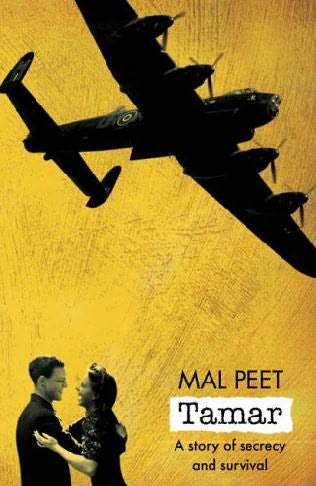 Dear Reader,
Dear Reader,Tamar and Dart are spies in the book Tamar who parachute into Nazi-occupied Netherlands during the "Hunger Winter" of 1944. Tamar's mission is to convince Dutch resistance groups to unify under the authority of the British government. Dart is his wireless operator, at a time when a WO's life expectancy in the field is just a few months. Tamar is undercover as a farm laborer sent home from Nazi work camps due to broken health. Dart is disguised as a doctor in residence at a sanatorium. They communicate only with the help of local resistance members, any of whom could be Nazi spies. Very little information is given about the characters beyond their duties as spies. Both are Dutch, but it is never revealed how they came to be recruited by the British or what their lives were like before they were spies. It is almost as though their choice to become spies has erased all other sense of identity. They have no past and no future beyond their present mission, even as personal feelings begin to color their relationships to one another and the organization they serve. Approximately 50 years later, a teen girl, also named Tamar, inherits a mysterious box from her grandfather. She and her cousin Yoyo take a trip into the British countryside seeking the origins of the Tamar river and the answer to a family secret that has remained hidden for generations. The two stories dovetail in a compelling novel about the legacy of a world at war, binding people across borders and generations. World War II happened so long ago that it is beginning to pass from memory into history. The world of TAMAR's spies is so different from our own that it might as well be an imaginary world. The secret hiding places, archaic communications like Morse code, and extreme precautions like cyanide pills add to a sense of a vanished and exotic world. It is also a period that has been fetishized over the years by many fictional portrayals. Instead of making history seem more immediate, the many movies and novels about the period can serve to make it seem less real, more a Hollywood invention than actual events impacting the lives of millions. Nazis have become stock characters, as recognizable in their uniforms with stiff marching and salutes as the villain in swirling cape and twirling mustache was in melodramas long ago. It would be easy to write another novel about the atrocities of the war without adding anything new to the literature. Mal Peet avoids cliche through his vividly detailed recreation of The Netherlands in the winter of 1944. He writes about a population being starved into submission by their Nazi occupiers, forcing "hunger trippers" to walk miles into the country in search of food. He writes about silken code sheets that can be packed into a tiny capsule and swallowed in case of capture, and about wireless operators on amphetamines trying to stay alert through stifling boredom and constant fear. Best of all, the author refuses to oversimplify the conflict into good vs. evil. Most of the trouble in the novel relates to the competing agendas between different factions of the resistance, and misunderstandings between individuals who are supposed to be fighting on the same side. Nazis aren't the only enemy. The novel's protagonists also battle against fear, boredom, isolation, starvation, mistrust, substance abuse and nerves stretched to a breaking point. The level of detail in the book, invoking a specific time and place, as well as the moral complexity required of its characters in a world where the self-interest of survival is stronger than any code of honor, distinguish TAMAR in a sea of novels about World War II. Mal Peet finds the perfect balance between thrilling adventure and serious history without relying on stock characters or sentimentality. TAMAR is not the first novel to be written about spies during WWII, but it is one of the few written for a young adult audience and is one of the best novels on the subject for readers of any age.
Thanks for the review. I will add this book to my TBR.
ReplyDeleteHey Mark - I am stopping in to say hi. Seen your post on Book Blogs and thought I would swing on in. Looks good. Connect with me anytime if you have questions, I am not an expert but I have blogged for awhile and asked a lot of questions to the great bloggers out there so I have learned a bit. :)
ReplyDeleteThis book is definitely good, I read it and now I want to use it for a book project because it's worth spending that much time with. :]
ReplyDeleteDoes anyone know good people to represent the main characters?
Just wondering.
This book is really good. I love hearing this perspective, it's not one I'd heard before.